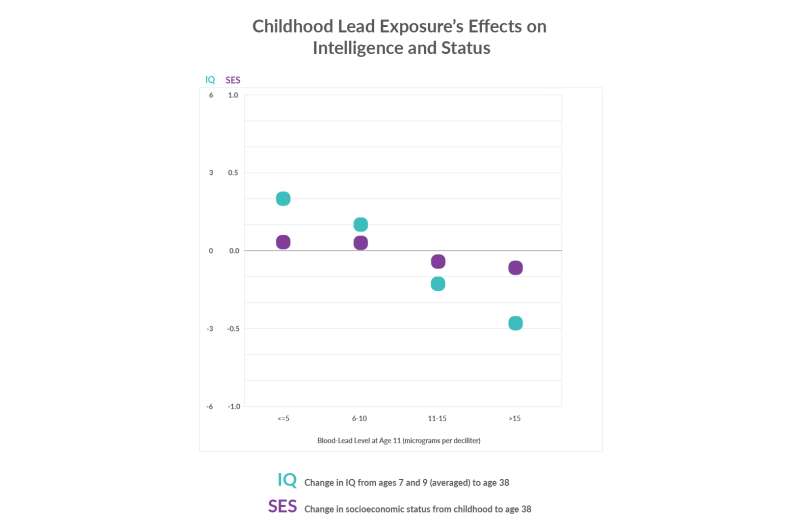New Zealand children's exposure to lead linked to lower IQ

Extremely high levels of lead in New Zealand cities in the 1970s and 1980s appear responsible for a loss of intelligence and occupational standing among today's adults.
The latest research from New Zealand's University of Otago long-running Dunedin Study shows that among more than 500 children who grew up in the era of leaded petrol, those exposed to lead had a lower IQ and social standing by the age of 38, relative to peers who had less exposure.
The research, published today in the Journal of the American Medical Association, says the effects are "slight but significant", also revealing that the higher the blood-lead level was in childhood, the greater the loss of IQ points and occupational status in adulthood.
New Zealand's lead levels were consistently higher than international standards during the 1970s and 1980s, largely due to motor-vehicle exhaust fumes.
The study's participants are part of the life-long examination of more than 1,000 people born in Dunedin in 1972 and 1973, and carried out by scientists from the Dunedin Multidisciplinary Health and Development Research Unit.
Blood-lead tests were conducted for 565 of them at age 11. Participants with more than 10 micrograms of lead per decilitre of blood at age 11 had IQs at age 38 that were, on average, 4.25 points lower than their less lead-exposed peers. They were also found to have lost IQ points relative to their own childhood scores. The study showed that for each five-microgram increase in childhood blood lead, a person lost about 1.5 IQ points by age 38.
The mean blood-lead level of the children at age 11 was 10.99 micrograms per decilitre of blood, slightly higher than the historical "level of concern" for lead exposure in the 1990s.
Ninety-four per cent of the children had blood-lead levels greater than five micrograms per decilitre, the level at which the United States' Center for Disease Control and Prevention now recommends a public-health intervention.
About half of the 11-year-olds had levels in excess of 10 micrograms per decilitre of blood.
The paper's senior author, Dunedin Study Associate Director Professor Terrie Moffitt of Duke University, says the data was from an era when such high lead levels were viewed as normal for children and not dangerous.
In 1984, when the Dunedin children were tested, only a lead level in excess of 35 micrograms per decilitre signalled a need for medical investigation. The study referred 10 children at the time for further testing.
"This research shows how far-sighted New Zealand was when the country banned leaded petrol in 1996.
"Lead exposure is very rare in Kiwi children today. But the findings suggest the importance of keeping up our vigilance against other environmental pollutants."

Researchers say what makes the New Zealand study an important natural experiment is that, because traffic goes through all neighbourhoods, the exposure to leaded petrol fumes was therefore distributed relatively evenly across all social groups.
That would not be the case with exposure to leaded paint or lead pipes in older structures, which pose more of a threat to poorer families.
The study also compared changes in social standing using the New Zealand Socioeconomic Index, which plots families on a six-point scale.
Children who were over 10 micrograms of lead attained occupations with socioeconomic status levels lower than those of their parents.
"As of the start of this year, the long-term adult cognitive outcomes of children exposed to lead were unknown, due to a lack of research. Our new paper fills that gap.
"In the 1980s, the Dunedin Study, guided by Professor Phil Silva, was influential in making New Zealanders aware that lead might be harmful to children," Professor Moffitt says.
Dunedin Study Director Professor Richie Poulton and Associate Professor Jonathan Broadbent, of Otago University's Faculty of Dentistry, are also co-authors.
Associate Professor Broadbent says today's adults are likely to have been affected by lead exposure as children.
"Most did not have their lead exposures tested as children. However, one way to test this is to test the baby teeth, if they have been kept."
Soil retains lead particles, with soils next to busy roads having the highest lead concentrations from the leaded-petrol era. Children playing outside either inhaled lead-laden dust or swallowed small amounts of leaded soil.
Lead is a powerful neurotoxin that can accumulate in a child's bloodstream, then settles into the bones, teeth and soft tissues and builds up in the body.
Paper co-author Professor Avshalom Caspi, of Duke University, says wherever you start in life, "lead is going to exert a downward pull".
"If everyone takes a hit from environmental pollutants, society as a whole suffers."
Main author Aaron Reuben, a Duke PhD candidate, says the lower occupational status is "partially but significantly explained by the loss of IQ".
"The cognitive deficits associated with lead persisted for decades, and showed in the kinds of occupations people got."
More information: Journal of the American Medical Association, jamanetwork.com/journals/jama/ … .1001/jama.2017.1712

















